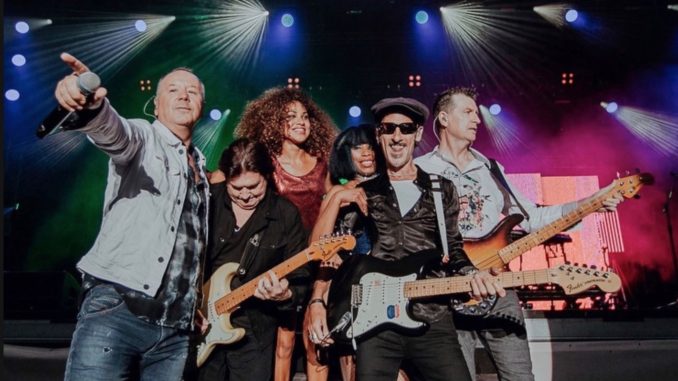
By DAN MACINTOSH
Witnessing an arena rock band — arena rock, at least in most countries outside the United States — in a relatively small theater, seemed a little weird.
This Scottish band gained its worldwide fame with “Don’t You (Forget About Me)” from the 1985 film, The Breakfast Club, began as an experimental pop outfit originally lumped in with other Big Music artists, like U2 and Waterboys, but quickly evolved into an act that preferred to create anthemic stadium pleasers.
Lead vocalist Jim Kerr danced and accompanied the band’s songs with big stadium-ready gestures, but also enjoyed the intimacy of mouthing ‘Are you having a good time’ to fans at the front of the stage.

Simple Minds opened with throbbing dance track, “The Signal and the Noise” from the new Walk Between Worlds and closed with the encore trio of “Once Upon a Time,” “Alive and Kicking” and “Sanctify Yourself.” The show was broken into two halves, with an intermission in between, and setlist that drew from all phases of the group’s long career.
Kerr was quite the gracious host, pre-announcing many songs and apologizing for his “dodgy” dancing. He also told a great story about a recent encounter on a plane trip where a seatmate confused him with Simply Red.
The night’s best songs were taken from the band’s earliest efforts. Although the act sadly left “Speed Your Love to Me” off the set list, the group wisely performed the bass-y “Waterfront” and the wordy “Up on the Catwalk” from the brilliant Sparkle in the Rain album from 1984.
Simple Minds is the creative duo of Kerr and guitarist Charlie Burchill, but a muddy sound mix prevented Burchill’s many guitar solos from rising majestically above the mix. The band also utilized prerecorded tracks, which somewhat hindered spontaneity.

No Simple Minds concert would be complete without “Don’t You (Forget About Me),” which turned into an all-attendee sing-along. It’s not just the group’s most popular song, but one that’s darn fun to sing. The group performed it – with hearty audience participation – near show’s end.
One might wish Simple Minds had remained a cooler – if, albeit, a more obscure – band, but the act evolved the way it decided to change and grow. As the music became bigger, it didn’t always become better. Even so, though, there’s no denying Kerr’s passionately unique manner of singing, which is always an auditory treat. Whether in a stadium or a theater, Simple Minds knows how to connect well with its audience.
